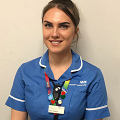COVID-19: ‘The biggest learning experience of my career’
Helen Dalgleish usually works in the General Paediatric Research Team at Royal Manchester Children’s Hospital. In March 2020, at the outset of the COVID-19 pandemic, she was asked to join a new team delivering Urgent Public Health (UPH) research studies, primarily involving adult patients. Helen reflects on the past 12 months working in coronavirus research.
I had been working in research for just six months when the pandemic began, and we went into national lockdown. I was asked to join a team based in Manchester Royal Infirmary (MRI) that was being put together to deliver UPH research studies.
My background is general paediatrics, and although I have worked in a variety of paediatric settings, I have never been involved in the care of patients over 18.

Helen Dalgleish
I was new to research, new to adult care and (along with everyone else) new to COVID-19, I must admit when I joined the Manchester University NHS Foundation Trust (MFT) COVID-19 Research Team, it was very daunting and quite overwhelming.
Regardless of this, there was a general feeling in the team that we had been given an opportunity to help in a time of national crisis. Retrospectively, I don’t think any of us could have predicted the personal or professional challenges the team, our Trust and the wider NHS would face in the coming year.
Our team is responsible for delivering several studies, from interventional trials looking for new treatments, such as RECOVERY, to medical device studies looking at quicker interventions, such as COSMIC-19.
In the earlier part of 2020, I was the study lead nurse on the RUXCOVID trial at MFT, which is testing whether the drug, ruxolitinib, could be a potential treatment for coronavirus. I later became one of the MFT study lead nurses for RECOVERY; which is taking place at 180 sites globally and is one of a number of COVID-19 studies that have been given UPH research status by the Department of Health and Social Care.
RECOVERY is testing a number of potential coronavirus treatments simultaneously. I have worked on both the adult and paediatric arms of this study, which has been extremely challenging at times, as COVID-19 effects children and adults differently.
In the early days of the pandemic, not only were we learning about COVID-19 as we went along, but we then were faced with a new COVID-related paediatric condition, known as PIMS. It is very rare, occurring in less than 0.5 per cent of children who have (or who have had) COVID-19. Most children with the condition will not be seriously affected but, in a very small number of cases, it can be serious. More information about PIMS can be found on the Royal College of Paediatrics and Child Health website.
RECOVERY has made national headlines with its findings, such as the low-cost drug, dexamethasone, reducing death in hospitalised patients by up to one third. I think that, as a team, this is something we are all extremely proud of contributing to.
Some of our treatments trialled in RECOVERY are now administered to patients as standard care across the NHS, and people are actively benefitting them, which is extremely rewarding to see.
Due to the nature of COVID-19 and the associated trials, clinical research nurses have become very visible in clinical areas, where very unwell patients are being cared for. Recruiting patients from these extremely busy areas – with the added challenge of PPE and necessary infection control procedures – has been physically and emotionally difficult at times.
Trying to explain a trial and gain informed consent from patients in busy/noisy areas has been challenging for us all, as patients cannot see your face and sometimes cannot hear you very well through the PPE.
Ward staff, although extremely busy and facing their own challenges, have been supportive and engaged with the research we are carrying out. As a research team, we have equally tried to support them where we can.
It has been heart-warming to see so many dedicated health care professionals doing their best for their patients in such a demanding environment.
The patient journeys have varied from devastatingly sad, to hope-filled and happy. So many patients I have seen have been adamant that they want to do what they can to reduce the impact COVID-19 is currently having on our society as a whole. As such, they want to take part in COVID-19 research whether it benefits them personally or not.
Without so many brave and selfless people participating in trials, we wouldn’t have come as far as we have in such a short space of time.
As a paediatric nurse and relatively new to research, I have relied heavily on my adult-trained colleagues to share their knowledge and experience with me in order for me to confidently and competently deliver on trials, which I am extremely grateful for. This whole experience has been one of professional development and continuous professional and personal learning.
Although many of these days have been hard for us all, I became a clinical research nurse because I wanted to help improve the care we provide within the NHS. I have felt a great sense of the work we do as being vitally important to finding a way through this crisis.
Although it has been testing at times, this will probably be the biggest learning experience of my career, and I’m so proud to have been part of the COVID-19 Research Team at MFT.





